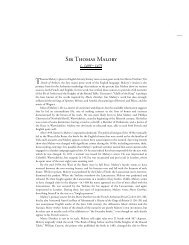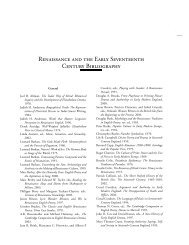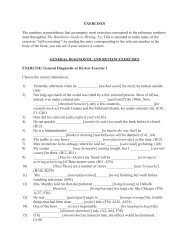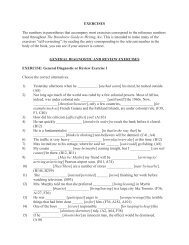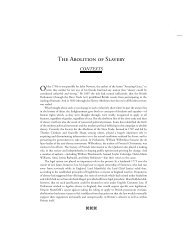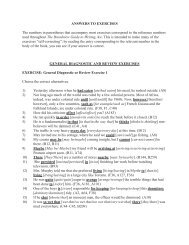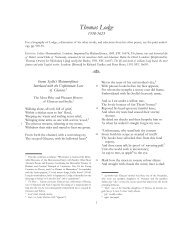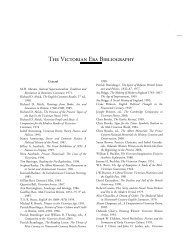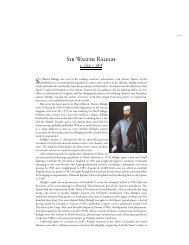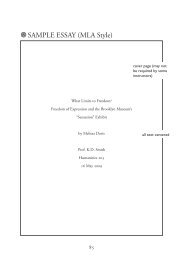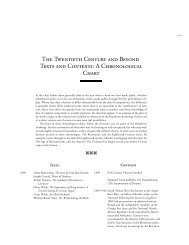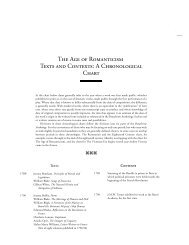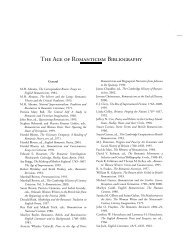Medieval Period Bibliography
Medieval Period Bibliography
Medieval Period Bibliography
You also want an ePaper? Increase the reach of your titles
YUMPU automatically turns print PDFs into web optimized ePapers that Google loves.
12 Broadview Anthology of British Literature<br />
and The Seafarer,” Anglo-Saxon Poetry: Essays in<br />
Appreciation, For John C. McGalliard, ed. Lewis E.<br />
Nicholson and Dolores Warwick Frese, 1975: 208–<br />
23.<br />
Roy F. Leslie, “The Editing of Old English Poetic<br />
Texts: Questions of Style,” Old English Poetry: Essays<br />
on Style, ed. Daniel G. Calder, 1979: 111–25.<br />
Roy F. Leslie, “The Meaning and Structure of The<br />
Seafarer,” The Old English Elegies: New Essays in<br />
Criticism and Research, ed. Martin Green, 1983:<br />
96–122.<br />
R.M. Liuzza, “The Tower of Babel: The Wanderer and<br />
the Ruins of History,” Studies in the Literary<br />
Imagination 36, 2003: 1–35<br />
Karma Lochrie, “Wyrd and the Limits of Human<br />
Understanding: A Thematic Sequence in the Exeter<br />
Book,” Journal of English and Germanic Philology 85,<br />
1986: 323–31.<br />
María José Mora, “The Invention of the Old English<br />
Elegy,” English Studies 76, 1995: 129–39.<br />
Andy Orchard, “Re-reading The Wanderer: The Value<br />
of Cross-References,” Via Crucis: Essays on Early<br />
<strong>Medieval</strong> Sources and Ideas in Memory of J.E. Cross,<br />
ed. Thomas N. Hall, 2002: 1–26.<br />
Peter Orton, “The Form and Structure of The Seafarer,”<br />
Studia Neophilologica 63, 1991: 37–55.<br />
Carol Braun Pasternack, “Anonymous Polyphony and<br />
The Wanderer’s Textuality,” Anglo-Saxon England<br />
20, 1991: 99–122.<br />
Carol Braun Pasternack, The Textuality of Old English<br />
Poetry, 1995.<br />
Alain Renoir, “A Reading Context for The Wife’s<br />
Lament,” Anglo-Saxon Poetry: Essays in Appreciation,<br />
For John C. McGalliard, ed. Lewis E. Nicholson and<br />
Dolores Warwick Frese, 1975: 224–41.<br />
Gerald Richman, “Speaker and Speech Boundaries in<br />
The Wanderer,” Journal of English and Germanic<br />
Philology 81, 1982: 469–79.<br />
Jane Roberts, “The Exeter Book: swa is lar 7 ar to<br />
spowendre spræce gelæded,” Dutch Quarterly Review of<br />
Anglo-American Letters 11, 1981: 302–19.<br />
John L. Selzer, “The Wanderer and the Meditative<br />
Tradition,” Studies in Philology 80, 1983: 227–37.<br />
T.A. Shippey, “The Wanderer and The Seafarer as<br />
Wisdom Poetry,” Companion to Old English Poetry,<br />
ed. Henk Aertsen and Rolf H. Bremmer, Jr., 1994:<br />
145–58.<br />
Barrie Ruth Straus, “Women’s Words as Weapons:<br />
Speech as Action in ‘The Wife’s Lament,’” Texas<br />
Studies in Literature and Language 23, 1981:<br />
268–85.<br />
Arnold V. Talentino, “Moral Irony in The Ruin,” Papers<br />
on Language and Literature 14, 1978: 3–10.<br />
Ruth Wehlau, “‘Seeds of Sorrow’: Landscapes of<br />
Despair in The Wanderer, Beowulf’s Story of Hrethel<br />
and Sonatorrek,” Parergon 15, 1998: 1–17.<br />
Karl P. Wentersdorf, “The Situation of the Narrator in<br />
the Old English Wife’s Lament,” Speculum 56, 1981:<br />
492–516.<br />
Rosemary Woolf, “The Wanderer, The Seafarer, and the<br />
Genre of Planctus,” Anglo-Saxon Poetry: Essays in<br />
Appreciation, For John C. McGalliard, ed. Lewis E.<br />
Nicholson and Dolores Warwick Frese, 1975: 192–<br />
207.<br />
Exeter Book Riddles<br />
Text: This anthology reprints the translations of Craig<br />
Williamson.<br />
Editions:<br />
George P. Krapp and Elliot Van Kirk Dobbie, eds., The<br />
Exeter Book, 1936.<br />
Bernard Muir, ed., The Exeter Anthology of Old English<br />
Poetry, 1994.<br />
Craig Williamson, ed., The Old English Riddles of the<br />
“Exeter Book,” 1977.<br />
Translations:<br />
Kevin Crossley-Holland, trans., The Exeter Book Riddles,<br />
rev. ed., 1993.<br />
Craig Williamson, ed., A Feast of Creatures: Anglo-Saxon<br />
Riddle-Songs, 1982.<br />
Criticism:<br />
Edward B. Irving, Jr., “Heroic Experience in the Old<br />
English Riddles,” Old English Shorter Poems: Basic<br />
Readings, ed. Katherine O’Brien O’Keeffe, 1994:<br />
199– 212.



